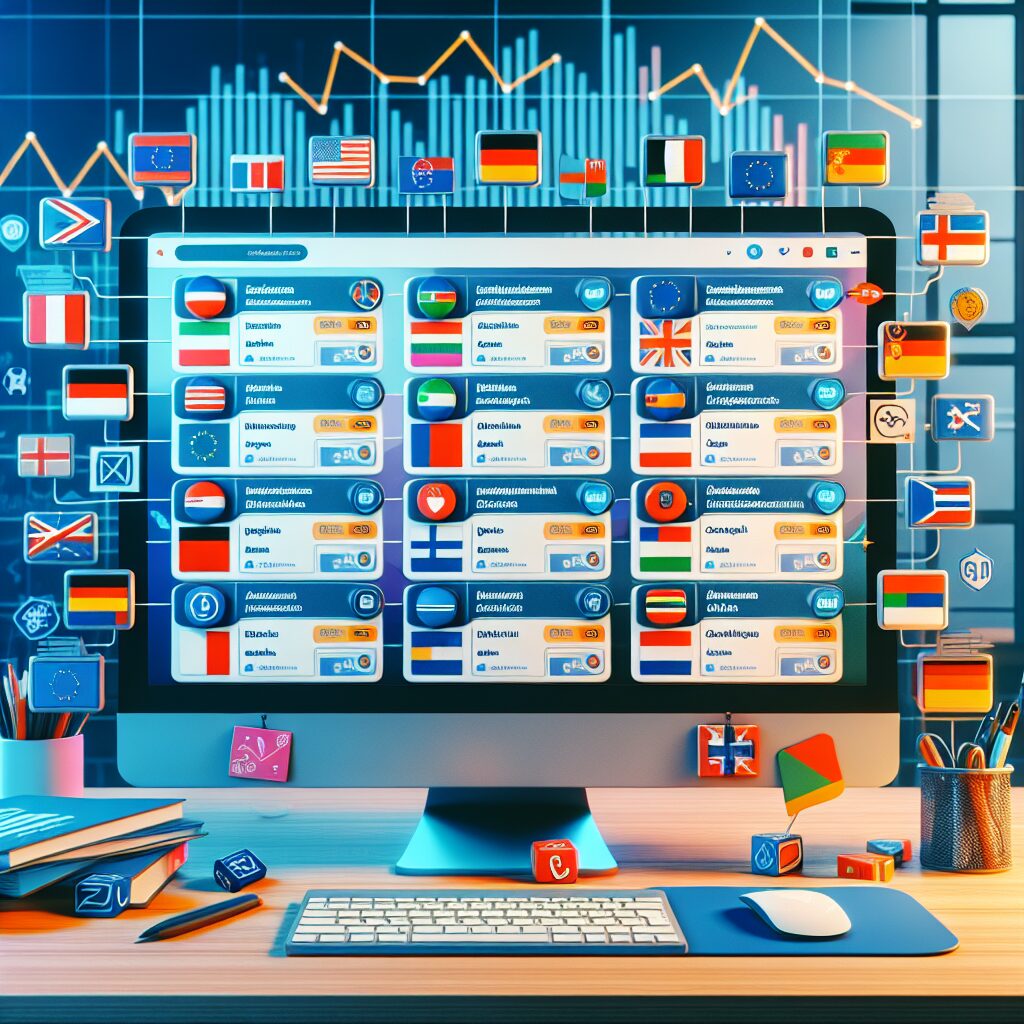About eldris
At Eldris, we automate SEO, multilingual site expansion, and EU compliance for brands scaling across Europe. Our AI-powered platform handles everything from content publishing to regulatory docs—so you don’t have to.
In This Article
- SEO automation platforms are now essential for DTC growth and localisation strategy.
- Look for platforms offering AI-powered keyword clustering and multilingual support tools.
- Prioritise ecommerce integrations that synchronise your content and product data effortlessly.
- Real-time crawling, compliance alerts, and automation-led diagnostics must be part of the tech stack.
- Compare beyond pricing—focus on adaptability, insights, and proven community results before selecting your platform.
- Eldris stands apart with its hybrid AI layering and contextual content feedback loops.
- Global expansion requires platforms with built-in EU compliance, hreflang intelligence, and automation-ready roadmaps.
- Invest based on long-term SEO dominance, not just short-term keyword rank improvements. Automation strategies for UK SMEs
Why SEO Automation Is Crucial for DTC in 2025
Adapting to Global Market Demands
In the rapidly evolving digital landscape, SEO automation platforms have become essential for DTC brands striving to maintain a competitive edge. As user behaviours shift and search engine algorithms grow increasingly complex, relying on manual SEO practices is no longer feasible. Automation not only improves accuracy and scale but also frees internal teams to focus on creativity and strategic growth.
Global markets introduce new layers of complexity, from language localisation to marketplace-specific compliance standards. SEO automation platforms are uniquely positioned to handle these variables at scale. Whether you’re targeting hyper-local keywords in Paris or optimising products for German-language marketplaces, automation ensures consistency, speed, and scalable execution across multiple regions and languages.
Digital commerce in 2025 is driven by increasingly refined consumer expectations and algorithm changes that prioritise UX and topical authority. DTC operations must be nimble. Implementing the right automation stack allows brands to nimbly react to search trends and competitive shifts without compromising quality or SEO integrity.

Top Features to Look for in Modern SEO Platforms
Automation, Analytics, and Localisation
Today’s SEO automation platforms offer far more than just automated reporting or keyword research. The best platforms combine powerful machine learning, deep analytics, real-time feedback, and multilingual capabilities in a seamless interface. These features enable DTC brands to localise content effectively, automate routine updates, and identify high-impact keyword opportunities in various geographic markets.
Many tools now come with automated content audits that flag underperforming pages or discover technical errors without manual intervention. These dashboards can automatically schedule page fixes or surface priority actions to technical teams. When coupled with detailed metric overlays—such as scroll depth, conversion rate, and keyword footprint—SEO managers gain unparalleled visibility into performance drivers.
“The right SEO automation platform doesn’t just analyse your site—it becomes an extension of your strategic team.”
Platform Comparison: What Matters Most
Choosing between SEO automation platforms depends on business goals, resource availability, and technical complexity. However, certain core pillars remain universal: data accuracy, UX simplicity, scalability, and actionable insights. Platforms should empower users across marketing, content, and development functions to collaborate efficiently from a single environment.
Some platforms focus heavily on backlink automation, while others invest in AI-driven clustering or semantic topic optimisation. For DTC brands, ecommerce compatibility and bulk content automation are also vital. Vendors who offer robust integrations with content management systems (CMS), headless setups, and ecommerce infrastructure (like Shopify Plus or BigCommerce) provide innate value beyond generic alternatives.
DTC leaders should prioritise platforms that evolve quickly with Google algorithm changes and provide proactive SEO diagnostics. Features such as intent modelling, real-time SERP monitoring, and zero-click analysis are signs of a platform prepared for tomorrow’s SEO landscape.
Integrations and Compatibility with Ecommerce Stacks
For DTC brands, synchronisation with ecommerce infrastructure is key. The best SEO automation platforms integrate flawlessly with platforms such as Shopify, Magento, WooCommerce, and headless commerce architectures. A strong integration enables seamless product URL indexing, meta field automation, and structured data injection, reducing manual workload considerably.
Additionally, content synchronisation with product catalogues enables the continual optimisation of product descriptions, category pages, and even user reviews—all through automation. Integrations with Google Merchant Center and social commerce platforms further essentialise omnichannel optimisation, driving consistent SERP visibility and revenue amplification.
Moreover, webhook and API access allows technical teams to build custom triggers that support smarter workflows. Fully API-enabled platforms let you customise deployment schedules, conduct cross-platform audits, and automate error resolution across staging and production environments.
Global Localisation and EU-Specific Factors
As DTC brands expand into European markets, localisation capabilities become non-negotiable. Leading SEO automation platforms account for linguistic nuances, hreflang implementation, and country-specific search intent. These platforms come with translation sync, multilingual keyword clustering, and international domain mapping—all essential for ranking effectively in native markets.
EU-specific compliance, such as GDPR guidelines, cookie banners, and domain-level accessibility, should also be accounted for in any SEO strategy. Automation platforms that prioritise compliance alerts, especially those embedded with real-time crawling technology, provide peace of mind while serving diverse user bases.
Brands must also consider geo-local signals like server latency, ccTLD benefits, and mobile-first responsiveness for individual markets. Only comprehensive platforms can effectively automate and monitor each of these variables at scale, enabling agile market entry without breaching best practices.
User Experience and Content Publishing Workflows
SEO and user experience (UX) are inextricably linked. Automation platforms must align with content publication workflows to deliver fast-loading, keyword-aligned, and semantically rich pages. Internal linking, page speed enhancements, mobile responsiveness, and UX metrics such as dwell time and bounce rate must be tracked and optimised holistically.
When evaluating platforms, ensure that editorial workflows are supported with schema auto-tagging, content calendar integration, and multi-tier publishing permissions. Some platforms even integrate AI copywriting to recommend snippet-compatible headings automatically, further accelerating agility in both SEO and publishing schedules.
Natural language processing further strengthens content classification and pillar page linking. When paired with site audits that detect redundant content or keyword cannibalisation, these automation capabilities dramatically elevate a brand’s topical authority and search visibility.
Compliance and Technical SEO Automation
Technical SEO demands escalate over time, particularly with evolving Google Core Web Vitals and structured data mandates. The best SEO automation platforms automate tech SEO essentials such as sitemap submission, canonical tags, advanced robots.txt rules, crawl budget optimisation, and even dynamic rendering for JavaScript-heavy sites.
Real-time error tracking, paired with intelligent alert systems, ensures that 404s, redirect loops, and broken schema are addressed before they impact search rankings. Automation can push these reports to Slack or your CMS to activate dev resolutions instantly, reducing downtime and protecting traffic.
DTC companies should also evaluate platforms for security-conscious compliance like HTTPS automation validation, domain audits, and integration with Certificate Transparency logs. In Europe, GDPR-compatible metadata suggestions further align your pages with regional legal protections.
AI-Enabled Keyword Strategies and Clustering
Keyword lists are only the start. Modern SEO automation platforms go far beyond by leveraging AI-powered keyword clustering, search intent decoding, and page-level opportunity scoring. Clusters are automatically formed around themes, allowing content teams to focus on topic authority—not just individual keywords.
In 2025, AI-driven clustering is indispensable for building pillar content strategies. These clusters inform your internal linking structure and prioritise content based on traffic potential and competitive gaps. Some platforms even forecast CTR (click-through rate) uplift for proposed content changes, grounding all SEO work in tangible ROI metrics.
Such predictive insights make AI essential—not optional—for enterprise-scale DTC operations. Look for platforms that integrate their keyword insights directly with content writer dashboards or headless CMS editors.
Eldris vs Traditional Automation Platforms
Eldris breaks away from the traditional model by emphasising fluid AI collaboration, real-time language adaptation, and ultra-granular SEO diagnostics. Where conventional platforms focus on bulk output or keyword throughput, Eldris excels in contextual awareness, semantic understanding, and multilingual content alignment.
Unlike fairly rigid tools used primarily for backlink analysis or batch metadata updates, Eldris offers a modular system that maps your business model with algorithmic precision. It analyses ecommerce page templates and dynamically adapts to sub-sector requirements, from fashion to homeware to direct-to-consumer SaaS.
Moreover, Eldris supports bidirectional content feedback. Not only does it aid draft creation using AI, but it also evaluates published outcomes using custom parameters refined to your KPIs. Learn more about SEO automation and technology for DTC brands
Community Feedback on AI SEO Tools
The SEO community has embraced automation with cautious optimism. While some traditionalists raise concerns about over-reliance on machine learning, the majority celebrate the scale, precision, and time savings it enables. Trusted platforms receive user acclaim for transparency, reliability, and depth of guidance.
Case studies show that brands using AI SEO tools report significantly lower bounce rates, faster publication cycles, and increased keyword share in difficult verticals. In forums across Reddit, Slack communities, and LinkedIn groups, Eldris, in particular, emerges as a standout for multilingual SEO management.
Influencers and agency veterans alike often cite intelligent task prioritisation and real-time monitoring as features that move automation from merely assistive to transformational. Read a related article
Cost vs Value in SEO Software Investments
The price of SEO automation platforms varies widely, but so does the value delivered. Some enterprise-grade platforms might cost several thousand pounds monthly but replace multiple tools, unify workflows, and eliminate costly errors. ROI should be calculated not merely by rankings but by labour saved, revenue uplift, and international scalability.
Low-cost platforms without AI functionality or compliance controls may work in the short term but could prove limiting as a brand scales. Budget-conscious choices must still provide mobile compatibility, ecomm adaptability, and growth forecasting tools to remain viable across 2025 market expectations.
Moreover, some vendors offer flexible subscriptions and usage-based pricing, which is vital for smaller DTC teams aiming to grow gradually. Making smart investments now can futureproof your brand for the next era of search—and deliver long-term dominance. Top SEO automation tools for 2025
Conclusion: Choosing the Right SEO Automation Platform
[CONCLUSION_CONTENT]
Great guide on compare-seo-automation-platforms-dtc – Community Feedback
What features matter most in a DTC SEO automation platform?
Key features include automated content publishing, multilingual support, EU compliance capabilities, technical SEO tools, integration options, and real-time analytics for fast-moving DTC ecommerce brands.
How do AI-driven SEO tools help scale DTC brands internationally?
AI tools automate keyword research, on-page optimisation, and content localisation, enabling DTC brands to rapidly expand into new markets without straining internal teams or sacrificing SEO best practice.
What makes Eldris different from traditional SEO automation platforms?
Eldris combines AI-powered site cloning, integrated compliance workflows, and multilingual content automation—uniquely tailored for DTC brands entering the European market.








